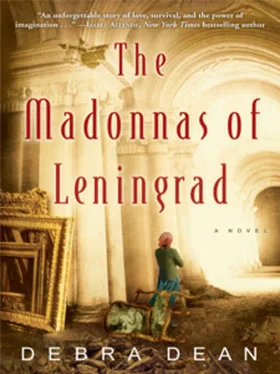“Are you all right, Marina?”
Marina reaches for Naureen’s hand and grips it tightly in her own. More distressing than the loss of words is the way that time contracts and fractures and drops her in unexpected places.
“I didn’t mean to upset you,” Naureen says. She scoots her chair closer to Marina and with her free hand rubs the back of Marina ’s hand.
It’s like a terrible thaw. Like the Hermitage that spring when all the snow on the roof melted. For weeks, they bailed water, carried buckets of filthy water out into the courtyard. Water leaked from out of the walls, through the roof. It ran down the Jordan staircase like a stream. And it just kept coming and coming.
Marina takes a slow breath. “I am becoming like the museum. Everything, it is leaking. It is horrible.”
Naureen doesn’t pursue this. She continues to stroke Marina ’s hand, and the two sit quietly. After a few minutes, Naureen changes the subject. “Tell me about Andrei when he was a baby.”
Marina brightens a little at the mention of her son. “Oh, my. When I delivered him, the nurses were astonished. The babies born during the blockade were runty things mostly, tiny and deformed or born dead. But not Andrei-he weighed over three kilos and he was perfect. He never cried. Not even during bombing raids. The shells were so loud, like devils shrieking, but he would be in his blanket, half asleep. His face was so calm. I would check him every few minutes-I was afraid he stopped breathing. I wondered even if he was born deaf. But he was an unusual child. People would stop me in the street to admire him. He had a head of golden curls just like his father.”
“Dmitri had blond hair?”
Marina shakes her head impatiently. “Not Dima. He isn’t a god, dear.”
Naureen smiles. “No, I guess he isn’t. None of them are, are they?”
The Rembrandt Room. At first, it seems empty, the room is so quiet and dark. The walls are a soft green, the color of faded billiards felt, and the flat ceiling is simply decorated. A series of half walls divides the room, so that one cannot see right away that it is actually full of people. They are quiet, contemplative people, old men in ruffs and modest young women lost in their own thoughts.
Beckoning from the far end of the room is a startling figure, Danae. She is an odalisque, a nude lying in repose, seductive, awaiting her lover. It is a classic pose, but Rembrandt in his genius has painted an ordinary woman, lush of body but not idealized. Her belly is full and spills onto the bed. Her face is almost plain but transformed by wonder.
Everything in the painting is luxuriant and, aptly, golden: the roundness of her heavy belly and delicate breasts, the soft, pale curves of her hip and thigh. The lavish boudoir is draped with heavy brocades and velvets and fine linens, and Danae, though she is nude, is adorned with coral bracelets. She stretches out full length on her bed, propped up on one elbow, with her other hand raised in awe or greeting toward her miraculous visitor. Zeus’s presence is obscured in drapery, but she is bathed in his radiant light. She sees the miracle, what the viewer cannot see. Behind her and half-hidden by drapery stands her elderly guard. She, too, looks on in amazement.
It is late. Most of the wedding party has gone back to the inn, but Helen has lingered. Naureen is gathering up the last of the wineglasses and plates left on tables outside, and Andrei is folding up the extra chairs and stowing them against the side of the house.
Helen studies the bottom of her wineglass. “Why didn’t you tell me she’s got Alzheimer’s?”
Andrei picks up another chair and adds it to the sheaf under the eaves. “We don’t know for certain that it’s Alzheimer’s. She’s got symptoms of dementia, but that’s not at all uncommon in people her age. It’s not my field, but I don’t think even a good gerontologist can diagnose it with complete accuracy.”
“Oh, for god’s sake, Andrei,” Helen snaps. “I wasn’t asking for a diagnosis. I’m just saying that you might have mentioned to me that our mother is losing her mind.”
Andrei stiffens, but before he can respond, Naureen shoots him a look. “We should have prepared you, Helen,” she says. She blows out a votive candle and sits down. “It’s been such a gradual thing, I guess we all kind of take it in stride, but it must be pretty upsetting if you haven’t seen her for a while.”
“I don’t think she knew who I was.” Helen presses a finger against one tear duct, then the other. “When I came to pick them up, she invited me in and asked about my family. The way she said it, it was like I was a stranger.”
Naureen gives her husband another look, a visual nudge, and he joins them at the table.
“She’s just a little absent sometimes. I’m sure she knew who you were,” Andrei offers.
“And what makes you so sure about that?” Helen’s voice is arch.
He takes a deep breath and visibly composes himself. “You’re right. I don’t know anything for sure. They both play their cards pretty close to the chest.”
“Tell me about it.”
“Papa won’t even talk about it. He pretends like she’s fine. But you can see why I’ve been pushing to get them moved. They’re doing okay now, but it’s good to have things in place.”
It is so quiet that they can hear the patter of moths batting against the porch light, the metallic pinging of a boat’s halyard in the bay.
Helen pours herself another swig of wine. “Has she ever said anything to you about living in a cellar in Russia?”
“What are you talking about?” Andrei asks.
“She mentioned some cousins, the family she lived with, and she said they all lived in a cellar. You don’t remember anything like that?”
“That was before my time.”
“No, I know, but she never said anything to you about a cellar?”
“No.”
“Don’t you wonder?”
“Wonder what?”
“Why we don’t know. Isn’t it weird that we don’t know anything about them?” Maybe it’s the wine or the lack of sleep, because she feels she’s being very clear and yet her brother doesn’t seem to get it. “She said they lived in a cellar with hundreds of people.”
“Helen,” Naureen says, “I don’t know how much credence you want to give to everything she says. Tonight, we were talking and one minute she seemed fine, and then next thing you know, she’s telling me how she used to eat glue and swim with whales. Oh, and she met Zeus.”
“Who?” Andrei asks.
“Zeus. The Greek god.”
“Maybe she knew someone named Zeus.”
“She said he was a god, Andrei. She also said he was your real father.”
“Zeus? She said Zeus was my father?” Andrei chuckles and shakes his head.
“Well, that makes perfect sense.” Helen smiles in spite of herself. “She’s always thought you were God’s gift. Now we know why.”
The two women laugh until they cry, and Andrei grins good-naturedly. “Yeah, yeah, very funny,” he says, and they crack up again.
“Tell her about the recliner,” Naureen urges.
“Well, for their anniversary, I bought them two new recliners. To replace those ratty old things they have in the living room. I could tell Papa liked them, but she kept at me until I sent them back. You know how she gets. Everything is more than she needs. I said, ‘Don’t you like them?’ And she said, ‘They’re lovely, but you should save your money. Buy yourself a lamb chop.’”
“A lamb chop?” Helen is poised for the explanation.
Andrei shrugs. “Who knows. She mixes up words.”
“Poor Papa.”
“I guess. To hear him tell it, though, everything’s just fine. You should see him. He’s learned how to cook. He makes a real mean shchi .” This is their mother’s cabbage soup, a wonderful concoction with prunes and peppers and carrots. Helen can almost smell the pungent aroma of it that used to steam up the kitchen windows on winter afternoons.
Читать дальше












